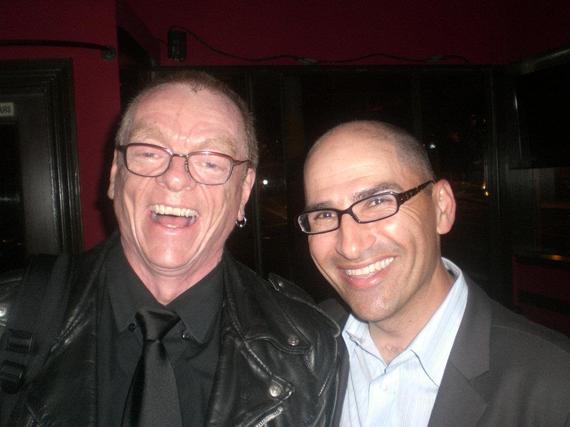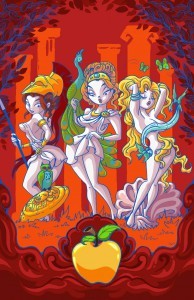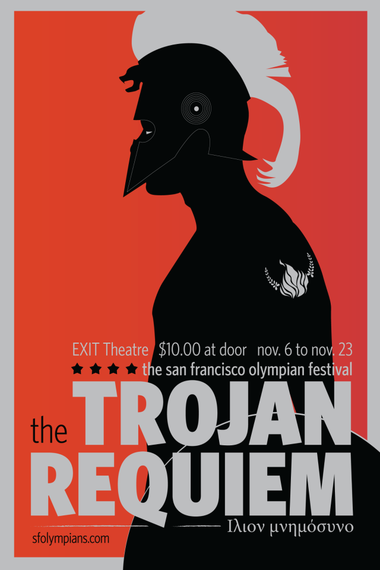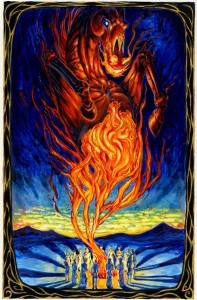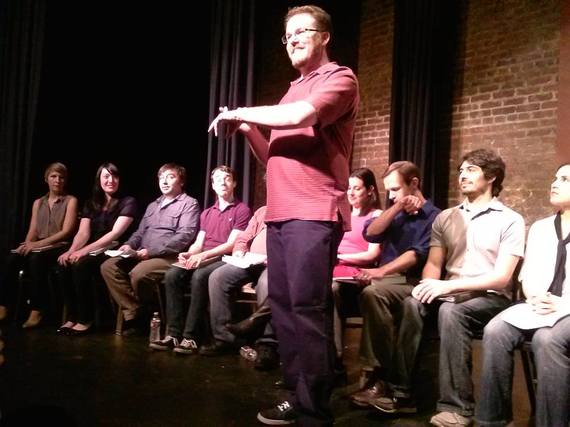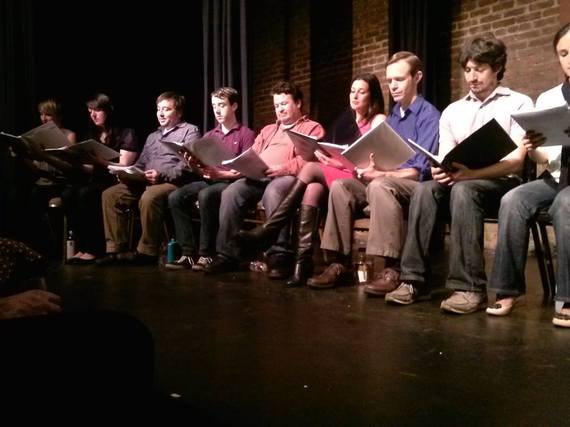In rare moments of nostalgia, I miss the good old days of gay bathhouses. The sheer randomness of who you might meet, grope, kiss, or fuck was a never-ending game of chance. Wandering through a dimly-lit maze, a hand might reach out, a towel drop alluringly, or a tongue salaciously invite you to embark on a dark debut into deliriously decadent delights.
For better or worse, the baths offered gay men a safe environment in which to go shopping for sexual partners. Some nights were total losses; on other evenings one could end up in a hedonistic bangaramathon whose sexual energy waxed and waned as people moved in and out of a pulsing, homoerotic cluster of male flesh. Sometimes an orgasm was met with admiring applause followed by the sweetest kind of conversation; at other times the man with whom you had just been so intimate vanished into the darkness.
Whether you saw him in the showers a while later or he ended up serving you brunch the following weekend, gay bathhouses offered a unique kind of meat and greet. I'll never forget bumping into Zohn Artman in the Press Room at the San Francisco Opera a year or two prior to his death. "I know you from somewhere, but I just can't place where that could be..." Zohn sighed as he tried to make small talk. My reply took him by surprise: "I was sitting beside you at the 21st Street Baths last night as you gave someone a very loud and vociferous blowjob!"
Back in the days of "Fuck him first, get his name and number later," many gay men went to bathhouses with the secret hope that a sexual encounter might lead to something more. Change a few pronouns in the following songs and their lyrics describe that glimmer of hope felt by so many men as they paid for a key to a locker (or private room), were handed a towel, and buzzed inside to enter a gay garden of earthly delights.
Staged readings of new plays pretty much work the same way. While each holds the lure of literary promise, what you get is little more than a dramatic crap shoot. One may encounter a short, fleeting playlet of comic brilliance, a mini-drama of rare poignancy, or a clumsily-written work that lands with a thud and seems incapable of finding an ending.
Two Bay area nonprofits are dedicated to encouraging playwrights to create new work. Because each depends largely on social media for publicity and box office sales, the audience at any playwright's reading is bound to include a healthy sampling of supportive friends, family, and coworkers.
- One organization offers a carefully defined incubator program which guides aspiring playwrights through the creative process of creating short plays.
- The other offers participation in an annual festival in which plays of varying lengths are given semi-staged readings in front of a live audience, thereby offering playwrights an invaluable opportunity to hear what their work sounds like when spoken by voices other than the ones in their heads.
* * * * * * * * * *
Last fall, Playground (the dramatic incubator) took advantage of special circumstances to offer up a night of brief musical delights entitled The Gershwin Plays. The challenge was to create a short play that had been inspired by a song written by George and Ira Gershwin. As a prelude to the evening, soprano Sharon Rietkerk performed an excerpt from Diane Sampson's work in progress entitled Sleeping Cutie: A Fractured Fairy Tale Musical (which receives its world premiere production at San Francisco's Thick House from April 17-May 11).
The plays chosen to be performed that night covered a wide range of ideas:
- Written by Patricia Cotter and directed by Doyle Ott, Someone To Watch Over Me featured Michael Asberry as a probation officer and Lyndsy Kail as one of his more irresponsible clients.
- Written by Josh Senyak and directed by Virginia Reed, Just For The Length of A Sigh took audiences back to the golden days of Molly Goldberg. To my delight, the script included a Yiddish word ("upstairssica") that I hadn't heard in at least 40 years!
- Written by Tom Swift and directed by Nancy Carlin, The Man I Love offered a poignant look at a pair of World War II recruits about to ship out to the war zone who suddenly realize that they are much more attracted to each other than they are to the girls with whom they should be dancing.
- Written by Tanya Grove and directed by Jim Kleinmann, Love Doctor, Heal Thyself featured an advice columnist (modeled after Beatrice Fairfax) who gets a taste of her own medicine.
- Written by Madeleine Butler and directed by Becca Wolff, A Beautiful Evening hilariously demonstrated what can go wrong when a slightly tipsy society matron is asked to stop eating all the olives at a cocktail party and then entrusted with facilitating a delicate social introduction that comes pre-loaded with unreasonable expectations.
- Written by Maury Zeff and directed by Gabriel Grilli, Love Spacewalked In was clearly an audience favorite (you can read more about it by clicking here).
* * * * * * * * * *
Over at the EXIT Theatre, 2013's SFOlympians Festival featured a wealth of local talent (92 actors, 30 writers, 25 artists and 12 directors). New works by two of the Festival's regular playwrights were of particular interest to me.
Kirk Shimano (a regular participant in both Playground and the SFOlympians Festival) decided to turn The Judgment of Paris upside down and inside out by moving the action to a seedy gay bar. Directed by Katja Rivera, Shimano's Paris benefitted as much from the cast's shameless mugging before a rowdy audience as it did from the playwright's hilarious script. According to the notes on the SFOlympians website:
"Paris was a prince of Troy and fought in the Trojan War, but he is perhaps most famous for his role in starting the conflict. When Zeus hosted a banquet on Mount Olympus for the marriage of Peleus and Thetis, he invited all of the deities save one: Eris, goddess of strife and discord. Incensed at this snub, Eris crashed the banquet and presented a golden apple bearing the inscription "For the fairest" to its guests. The goddesses Hera, Athena, and Aphrodite immediately claimed this prize and refused to share it. Zeus delegated the job of choosing the recipient of the apple to Paris. After much conniving, Aphrodite offered Paris the love of the most beautiful woman in the world if she was chosen the winner. Paris chose Aphrodite, which led to Aphrodite revealing Helen of Sparta, which inspired Paris to abduct Helen from King Menelaus (the act that set the Trojan War into motion)."
Shimano's reworking of Greek mythology transformed Hera, Athena, and Aphrodite into three tacky drag queens. Although Jeremy Cole's haughty characterization of Margo Harrington caused one audience member to crow about his success at impersonating Angela Lansbury, Cole's drag snobbery offered a highly refined contrast to the bloated, garishly dressed John Lennon Harrison's portrayal of Martha Val Martha, and Perry Aliado's overly precious take on Columbia Vanderbilt Yale (who craved an invitation to one of Margo Harrington's A-Gay parties).
The fun began with the arrival of an obnoxiously straight and bitter Erissa (Molly Benson), who pushed herself into becoming the emcee for the beauty contest and promptly set the drag queens up to compete against each other in a series of vicious party games. With Mackenszie Drae portraying Paris as a studly (albeit dimwitted) college jock and Alaric Toy's insecure Hermes transformed into the lovesick gay wingman (who has a hopeless crush on his handsome friend), The Judgment of Paris quickly turned into a gay catfight with Michelle Talgarow forcefully barking out Shimano's stage directions. With no room for subtlety, a brazen good time was had by all.
* * * * * * * * * *
The 2013 SFOlympians Festival closed with the first (and perhaps only) reading of a script that its founder, Stuart Bousel, has been laboring over for at least eight years. Bousel's lifelong fascination with Greek mythology led him to tackle Homer's Iliad by creating a narrated stage version of the story that would be too complex (and require too many actors) to ever get produced commercially. Unless, of course, he had a festival of his own in which his play could be read before a live audience.
To outline the challenges he faced, Bousel explained that:
"The Trojan Horse is the first "Final Solution" in Western military history. In the tenth year of the Trojan War, the commander of the Argive army, Agamemnon, tasks his smartest man, Odysseus, with coming up with a way inside Troy's impenetrable walls. Odysseus envisions the Horse, though in some versions he is inspired by Poseidon, and in others by Athena. The Horse is constructed from the broken ships of the Argive army and bits of driftwood. It is large enough that as many as two dozen men (depending on the poet) are sequestered inside, fully armed, so that when the Trojans take the horse into their walls, these same men are able to slip out in the night and open the gates of the city, leaving it vulnerable to the hidden army waiting outside. Famously, the prophet Laocoon and the princess Cassandra both denounce the Horse as a trick, but neither is listened to and the Trojans claim what they believe is a peace offering from their rivals, thus prompting the famous saying "Beware of Greeks bearing gifts." The Trojan Horse itself has lived on in popular vernacular in a variety of ways, usually implying something that is two-faced or treacherous in nature, a terrible thing disguised as a beautiful one, or that which has, inside of it, something entirely unexpected."
Bousel's solution to the epic task he created for himself?
"Fascinated with the Horse and the War in general, I sought to write a comprehensive stage version of the War, tracing it from its roots through to the fall of Troy. I will be condensing where necessary, but also illuminating specific moments that touch on the specific theme of the duality and treasure/trick aspect of the War, from the Horse to Helen to the Gods themselves, as well as the broader themes of violence, disillusionment, love, objectification, honor, legacy, history and western literature and philosophy as a whole. Rather than trying to reduce the scope of the epic to fit into the modern American theater sensibility of small cast and small space, I seek to celebrate the erratic and almost incomprehensible nature of the war and create the largest, most extravagant play of my career with a sprawling adaptation that includes elements of my favorite versions, associated legends, and additions of my own. Stylistically, the play will combine intimate moments and traditional scenes smashed up against narrative choruses, direct address monologues, battle vistas and various experimental theater ideas and genre/tone departures such as game shows and reality television. Will it succeed? Will it fail? Probably."
Bousel hit on a winning solution by assigning each actor to an archetype (which could be used to represent both Greek and Trojan characters). His dedicated cast consisted of:
- Maria Leigh (The Storyteller)
- Mariah Jane Castle (The Beautiful Girl)
- Ashley Cowan (The Smart Girl)
- Siobhan Marie Doherty (The Proud Girl)
- Theresa Miller (The Woman)
- Jan Gilbert (The Mother)
- Eli Diamond (The Boy)
- Nikolas Strubbe (The Golden Boy)
- John Lennon Harrison (The Strong Brother)
- Tavis Kammet (The Weak Brother)
- Carl Lucania (The Father)
- Dan Kurtz (The Hero)
- Mackenszie Drae (The Black Sheep)
- Brian Martin (The Friend)
- Matt Gunnison (The Man)
- Paul Stout (The Old Man)
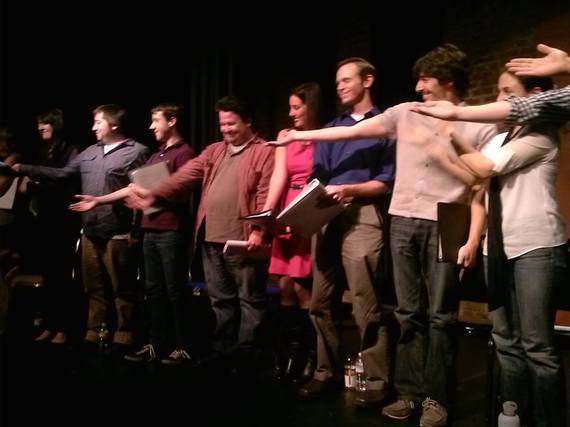
The cast for the world premiere of The Horse or See Also All pays
tribute to playwright Stuart Bousel (Photo by: Charles Lewis III)
With the playwright seated stage right, reading his stage directions, the large cast (which had only had a week to prepare for this reading while many of them appeared in other plays during the SFOlympians Festival) did a splendid job of bringing Bousel's script to life. Considering the running time of nearly two and a half hours, special credit goes to director Ariel Craft who quickly laid down a musical pace for Act I's tremendous amount of exposition (which brought to mind Meredith Willson's famous "Rock Island" number from The Music Man ).
Although the second act sagged a bit, that was partially due to an increasingly warm theatre, the large number of disillusioned Trojans and Greeks meeting their deaths, and the various twists and turns which led to a surprisingly moral game show finale. I was particularly impressed by the performances of Nikolas Strubbe, Matt Gunnison, Mackenszie Drae, and Dan Kurtz.
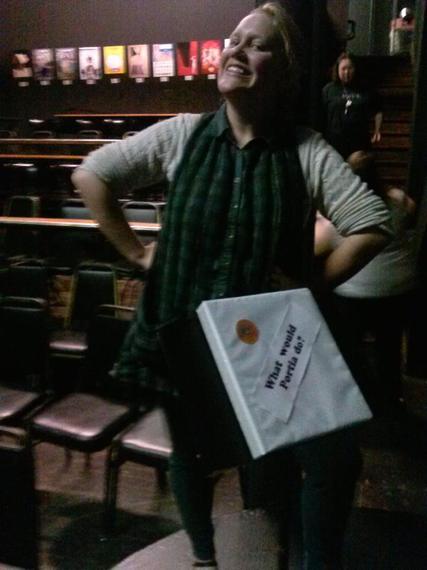
Director Ariel Craft relaxes after the world premiere of
The Horse or See Also All (Photo by: Charles Lewis III)
Overall, I would rate this evening an artistic triumph which brought a fitting close to the 2013 SFOlympians Festival. While Bousel is the first to admit that his play doesn't have a chance in hell of receiving a commercial production, I'd venture a guess that it could find surprisingly sustainable life on the college circuit. With a script requiring a cast of 16 actors, it's a perfect joint project for a university's theatre and English departments.
Some adventurous high school drama clubs (where English classes are studying Homer's Iliad) might also want to sink their teeth into a script which can be staged with minimal costumes and scenery. The Horse or See Also All transforms one of literature's most famous epic poems into a highly relevant and accessible exploration of the costs and foibles of endless war.
To read more of George Heymont go to My Cultural Landscape

